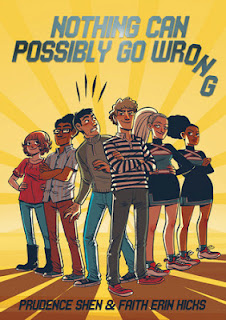Today, we are happy to welcome Prudence Shen, author of the graphic novel Nothing Can Possibly Go Wrong (a collaboration with comic artist Faith Erin Hicks). It’s a thrilling, thoughtful, downright hilarious tale of a high school basketball star and his nerdy neighbor/best friend, one of whom gets unceremoniously dumped by the head cheerleader while the other is desperate to take his team to the robotic competition (I’ll let you figure out which is which). There are twists, turns, fights, chases, escapes, dirty dealings, new crushes, and possibly some robots beating the screws out of other robots. I asked Prudence to talk about the ramifications of the social hierarchy of so-called cliques within the educational institutions of early to mid adolescents.
Just kidding. She’s going to talk about robots.
Release Date: May 7, 2013
Publisher: First Second
You wouldn’t expect Nate and Charlie to be friends. Charlie’s the laid-back captain of the basketball team, and Nate is the neurotic, scheming president of the robotics club. But they are friends, however unlikely—until Nate declares war on the cheerleaders. At stake is funding that will either cover a robotics competition or new cheerleading uniforms—but not both.
It's only going to get worse: after both parties are stripped of their funding on grounds of abominable misbehavior, Nate enrolls the club's robot in a battlebot competition in a desperate bid for prize money. Bad sportsmanship? Sure. Chainsaws? Why not. Running away from home on Thanksgiving to illicitly enter a televised robot death match? Of course!
In Faith Erin Hicks' and Prudence Shen's world of high school class warfare and robot death matches, Nothing can possibly go wrong.
Most stories require some amount of research. In the case of Nothing Can Possibly Go Wrong, my academic background in the liberal arts was wholly useless, and I spent a lot of time looking up whether or not high school students actually built the types of robots I was imagining. The closest I've ever been an engine of any kind was when I took a black and white photography class that was across the hall from the auto shop room. How do you build a battle bot? Is it horrifically expensive? Weirdly, I spent a solid week in 2008 trolling the internet for the biggest SUV manufactured in the U.S. It doesn't come up in the graphic novel, but the original prose had an entire tangent about how Charlie's "borrowed" car is big enough to have a table built into the back.
No matter how thorough, research isn't going to be able to guarantee you get everything exactly right. There's always going to be one smart-ass expert who delights in pointing out the big and little things you get wrong — usually long after you can do anything about it. But a thorough vetting can keep you from embarrassing yourself too badly, and even if you're not overly concerned with accuracy, I think it's always in the interest of the story for the plot to pass a basic smell test.
So with that in mind, I called up a browser window and started looking at information about battlebots.
Here's where the double-edged blade of research comes in:
While it can be enormously helpful, it can also be a distraction. Did I need to watch every video on YouTube that comes up when searching "greatest battlebot fights?" No. Did I do that anyway and then justify it at 4 a.m. because it was research? You bet your ass I did. And then I went onto the Home Depot website and priced a bunch of chainsaws. I have no doubt the CIA has flagged me under some suspected serial murderer file, where I'm guessing a lot of writers who have to Google stuff like "homemade poison??" and "how do you liquefy a body?" reside as well.
(Has anybody else ever typed "I swear I'm not a murderer I am just writing a story about murderers" into Google just so that whoever's logging this data has it on the record? No? Okay. Me neither.)
Moving on.
No matter how much more footage of gruesome motorized carnage there was available for research purposes, I was going to have to commit words to paper at some point. And while knowing those fights and the hardware helped enormously when constructing the story, after a while even I had had to admit I was using it to explain away uncertainty. I was writing a story about the kids who were building these bots, their adventures and teenage angst, not constructing a guidebook. Sometimes the danger of being experts in what we write is the temptation to turn a story into an academic exercise: I kept having to remind myself that nobody was reading Nothing Can Possibly Go Wrong to learn how to put together a robot and to resist the urge to write it like they might.
It took a lot of undignified late nights trolling YouTube and producing zero paragraphs to reach this conclusion, but I got there eventually: research is essential and oftentimes fun, but it's all too easy to get bogged down. All of my stacks of notes didn't amount up to a plot or characters, and those were always going to be the engine moving a story forward.
In short: Oh my God, Pru. Stop bookmarking videos of robots bursting into flame and finish writing your stupid novel. This crazy-big SUV with a table in the back isn't going to steal itself.
And also, if I occasionally decided to type "I swear I'm not a crazed Bond villain planning on building a robot army I am just writing about robots" into my search engine, that was just taking a preventative measure. I've done my research about secret spy prisons, okay?










































No comments:
Post a Comment